Bill seeks to prevent laws prohibiting residential gardens
by January 17, 2025 12:27 pm 2,127 views

Image from the University of Arkansas Division of Agriculture Cooperative Extension Service
Your tall corn stalks and brushy tomato plants should be safe from prohibitive local government laws if a bill filed by Rep. DeAnn Vaught, R-Horatio, survives the legislative process. You’ll still have to deal with mites, nematodes, small critters, and other pests.
The bill, filed Wednesday (Jan. 15), “intends to encourage and protect the development of sustainable cultivation of vegetables and fruits” on residential property “for personal consumption or noncommercial sharing, as an important interest of the state.” Sen. Breanne Davis, R-Russellville, is the Senate sponsor of the proposed legislation.
“A person may cultivate a vegetable garden on his or her own private property or on the private property of another person with the permission of the owner in any county, municipality, or other political subdivision of this state. A local ordinance or regulation regulating vegetable gardens on residential properties is void and unenforceable,” notes language in the two-page bill.
The bill, which includes protections for pollinator plants, has been referred to the House Agriculture, Forestry and Economic Development committee. (Link here for a PDF of the proposed legislation.)
Vaught, who grew up on a farm, said she has grown more concerned in recent years about the freedom of individuals to have home gardens. She said governments should not allow large corporations to dominate the country’s food supply and make it difficult for people to raise their own food, be it vegetables or animals.

“I don’t want there to ever be a way for some to overreach and tell people they can’t grow their own food. I’m really big on people being able to sustain themselves,” Vaught said. “The more we lose small farms the more worried I get about the government owning more of our food, and I don’t want there to ever be a time in my grandchildren’s lives when they are not allowed to grow their own gardens.”
John Wilkerson, Arkansas Municipal League general counsel and legislative director, said the league will work with Vaught and Davis to avoid any potential problems with the proposed legislation.
“As far as I know, no city or town is regulating vegetable gardens, and I do not know of any city or town planning to. With that said, we are always mindful that any legislation may have unintended consequences. We’ll dive deeper, and if we see any major issues we will make sure Representative Vaught and Senator Davis hear from us about those issues along with ideas on ways to find a solution,” Wilkerson said.
The Big Blog of Gardening noted in a Dec. 9, 2024, article that many states have laws at various government levels that make it difficult or impossible for homeowners to have a garden.
“These laws aim to preserve neighborhood aesthetics, preventing gardens that don’t align with a specific look,” the article noted.
Fort Smith, the state’s third-largest city, does not have laws prohibiting home gardens, but the city of almost 90,000 does have rules home gardeners must follow. For example, those tall corn stalks – or any other tall plant – can’t create a blind spot for other drivers, or when backing out of a driveway. Also, the city has restrictions on how high grass can grow between crops, and residential gardeners can’t create water retention areas.
Family gardens were once common, and proved to be a critical part of the national war effort during World War II. Around 40% of U.S. produce came from “victory gardens” by 1944, according to Smithsonian Gardens. It is estimated that family farms provided 8 million tons of food by the time the war ended in 1945.
“During America’s involvement in World War II (1941–1945), the Victory Garden Program strove to reduce demand for commercially grown vegetables, packaging materials, and transportation needs by encouraging Americans to grow their own produce and preserve and can their surplus harvest,” according to the Smithsonian Gardens.
The National Gardening Association (NGA) reported in 2024 that many Americans still garden, with 81% of households responding to an NGA survey saying they were “taking part in gardening activities” in 2023. The percentage is higher than in pre-COVID years, according to the NGA. In 2020, the average household spending on gardening was $458, with that rising to $671 by 2023.
Vaught expects opposition to the proposed bill.
“There will be somebody who will come and say, ‘If they (gardens) are within city limits, they shouldn’t be able to blah, blah, blah.’ And I don’t agree with that. I believe in people being able to sustain themselves however they need to sustain themselves,” she said.
